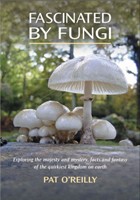Russula cuprea Krombh. - Gnarled Brittlegill
Phylum: Basidiomycota - Class: Agaricomycetes - Order: Russulales - Family: Russulaceae
Distribution - Taxonomic History - Etymology - Identification - Culinary Notes - Reference Sources
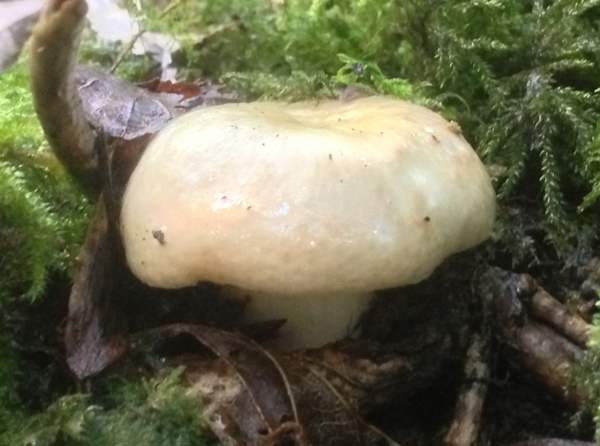
Russula cuprea is mycorrhizal with Beech trees. It is a seldom-recorded summer and autumn brittlegill mushroom, and because of its colour variability it poses a significant identification challenge.(Several colour varieties and colour forms have been formally described.)
Distribution
An uncommon to rare find in Britain and Ireland, Russula cuprea is localised, its distribution being limited mainly to areas of Beech woodland on alkaline soil. This species occurs also in parts of central and northern Europe, where it is not recorded as being plentiful.
Taxonomic history
This brittlegill mushroom was described in 1845 by Czech mycologist Julius Vincenz von Krombholz, who gave it the binomial scientific name Russula cuprea which most mycologists still use today when referring to this species.
Synonyms of Russula cuprea include Russula cinnamomicolor Krombh., and Russula urens Romell ex Singer.
Etymology
Russula, the generic name, means red or reddish, and indeed many of the brittlegills have red caps (but many more are not, and several of those that are usually red can also occur in a range of other colours!). The specific epithet cuprea means copper coloured and refers to one of the more typical colours of caps of this mushroom.
Identification guide
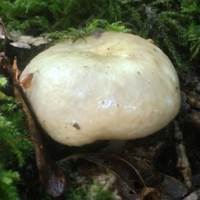 |
Cap3 to 7cm in diameter, the cap is convex at first, later flattening and often with a slightly depressed centre; smooth; colour often copper brown (hence its specific name) but very variable ranging from pale olive yellow or greenish brown through cinnamon brown to vinaceous, purple brown and occasionally red. The cuticle peels half-way to the centre. |
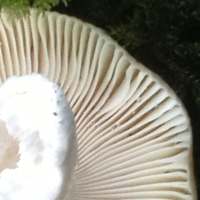 |
GillsAdnexed, fairly crowded, brittle; initially pale ochre, they darken gradually to a deeper ochre as the fruitbody ages. Stem2 to 3cm in diameter and 4 to 8cm tall, the brittle stems, often hollow, are white but bruise ochre, especially towards the base, when handled. The stem flesh is white and turns dul pink when touched with FESO4. There is no stem ring. |
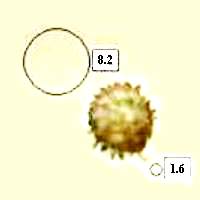 |
SporesEllipsoidal, 8.4-11 x 6.7-8.5μm (excluding spines); ornamented with sharp isolated warts up to 1.5μm tall. Spore printOchre. |
Odour/taste |
Odour slight, fruity; taste initially mild then acrid. |
Habitat & Ecological role |
In Beech (Fagus) woodland, often on lime-rich soil. |
Season |
July to October in Britain and Ireland. |
Similar species |
Russula ochroleuca has a pale ochre-yellow cap, often greening slightly in the middle; it has fairly hot, peppery flesh. There are many other ochre-to-brown Russula species, and microscopy and/or chemical tests are often necessary for confident identification to species level. |
Culinary Notes
Edibility unknown, but its acrid taste should be a deterrent. In any case this is a rare brittlegill, at least in Britain and Ireland, and therefore it cannot be considered as a mushroom of culinary importance.
Reference Sources
Pat O'Reilly (2016). Fascinated by Fungi, First Nature Publishing
Geoffrey Kibby (2011).The Genus Russula in Great Britain, published by G Kibby.
Roberto Galli (1996). Le Russule. Edinatura, Milan.
Paul M. Kirk, Paul F. Cannon, David W. Minter and J. A. Stalpers. (2008). Dictionary of the Fungi; CABI.
Taxonomic history and synonym information on these pages is drawn from many sources but in particular from the British Mycological Society's GB Checklist of Fungi.
Fascinated by Fungi. Back by popular demand, Pat O'Reilly's best-selling 450-page hardback book is available now. The latest second edition was republished with a sparkling new cover design in September 2022 by Coch-y-Bonddu Books. Full details and copies are available from the publisher's online bookshop...
